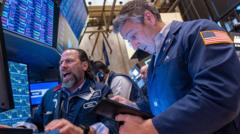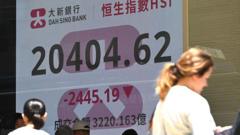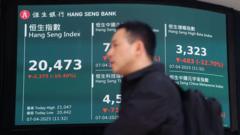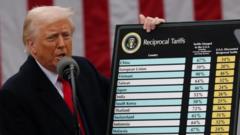**Investors are concerned as markets tumble, raising questions about the potential for a larger economic downturn.**
**Global Markets in Turmoil: The Impact of New Tariffs**

**Global Markets in Turmoil: The Impact of New Tariffs**
**Analysis of the ongoing fallout from US tariff impositions on global stock markets.**
The imposition of new tariffs by the United States is sending shockwaves through global financial markets, with stock indices experiencing notable declines. As fears grow, many are contemplating whether these fluctuations could signal a "crash," a term typically reserved for significant and rapid market contractions.
Historically, a market crash is defined by a drop of 20% or more from recent highs, often occurring swiftly. The catastrophic events of October 19, 1987, known as Black Monday, saw a staggering 23% decline in a single day, while the infamous Wall Street Crash of 1929 marked a severe downturn that initiated the Great Depression. In contrast, the current US market has seen declines of approximately 17% from its February peak, showing a 2% dip from last year's figures. The UK's FTSE index also reflects considerable downturns, often lagging behind US movements due to differing closing times.
This development echoes the rapid declines experienced during the early Covid-19 outbreak in 2020. The criteria for a "bear market" is within reach, as investors feel the pressure of a potential further downturn.
For many, stocks are not merely investments; they represent retirement savings through pension plans. Defined benefit schemes ensure a stable income, whereas defined contribution plans’ values fluctuate with market trends. Fortunately, a portion of these pension contributions is often diversified into safer investments like government bonds, which typically appreciate during market drops. Thus, those nearing retirement may be less susceptible to these fluctuations, thanks to a greater allocation of bonds within their portfolios.
Despite the concerning market trends, history suggests that long-term investments in stocks can yield positive outcomes. However, the impetus for these declines is rooted in expectations around profitability; the tariffs introduced by President Trump are anticipated to hike prices and consequently lower demand—a scenario that puts companies’ future profits at risk.
In conclusion, while current declines could signify volatility within pension savings, the broader concern lies in the potential economic ramifications of these tariff policies. A significant downturn in the stock market often serves as a harbinger of economic struggles, indicating potential challenges ahead. Hence, while it’s critical to monitor the performance of individual investments and savings, the overarching concern is the overall health of the economy. As the trade tensions between the US and China continue to escalate, investors remain on high alert for further developments.
Historically, a market crash is defined by a drop of 20% or more from recent highs, often occurring swiftly. The catastrophic events of October 19, 1987, known as Black Monday, saw a staggering 23% decline in a single day, while the infamous Wall Street Crash of 1929 marked a severe downturn that initiated the Great Depression. In contrast, the current US market has seen declines of approximately 17% from its February peak, showing a 2% dip from last year's figures. The UK's FTSE index also reflects considerable downturns, often lagging behind US movements due to differing closing times.
This development echoes the rapid declines experienced during the early Covid-19 outbreak in 2020. The criteria for a "bear market" is within reach, as investors feel the pressure of a potential further downturn.
For many, stocks are not merely investments; they represent retirement savings through pension plans. Defined benefit schemes ensure a stable income, whereas defined contribution plans’ values fluctuate with market trends. Fortunately, a portion of these pension contributions is often diversified into safer investments like government bonds, which typically appreciate during market drops. Thus, those nearing retirement may be less susceptible to these fluctuations, thanks to a greater allocation of bonds within their portfolios.
Despite the concerning market trends, history suggests that long-term investments in stocks can yield positive outcomes. However, the impetus for these declines is rooted in expectations around profitability; the tariffs introduced by President Trump are anticipated to hike prices and consequently lower demand—a scenario that puts companies’ future profits at risk.
In conclusion, while current declines could signify volatility within pension savings, the broader concern lies in the potential economic ramifications of these tariff policies. A significant downturn in the stock market often serves as a harbinger of economic struggles, indicating potential challenges ahead. Hence, while it’s critical to monitor the performance of individual investments and savings, the overarching concern is the overall health of the economy. As the trade tensions between the US and China continue to escalate, investors remain on high alert for further developments.




















